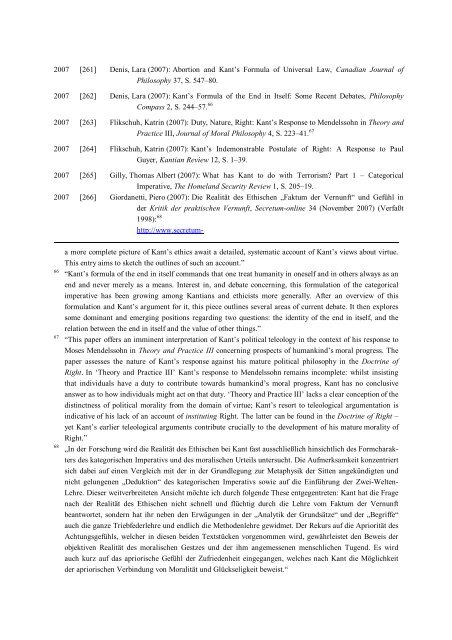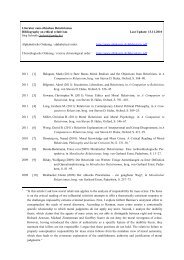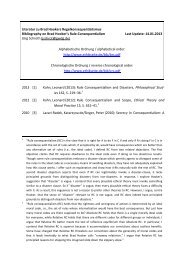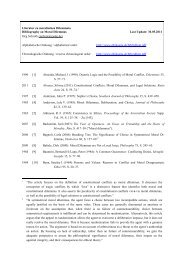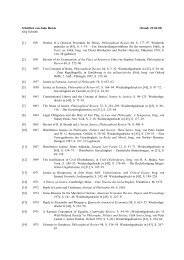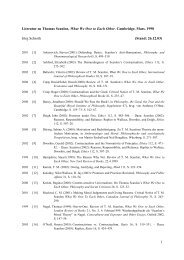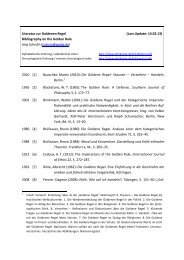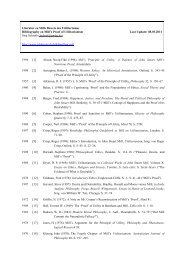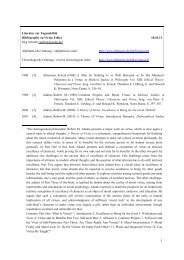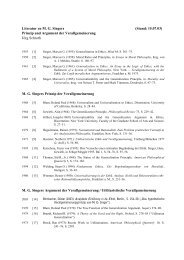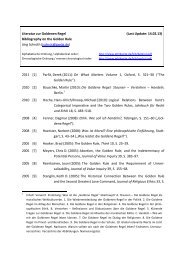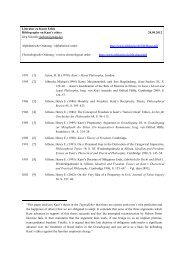Chronologische - Ethikseite
Chronologische - Ethikseite
Chronologische - Ethikseite
Create successful ePaper yourself
Turn your PDF publications into a flip-book with our unique Google optimized e-Paper software.
2007 [261] Denis, Lara (2007): Abortion and Kant’s Formula of Universal Law, Canadian Journal of<br />
Philosophy 37, S. 547–80.<br />
2007 [262] Denis, Lara (2007): Kant’s Formula of the End in Itself: Some Recent Debates, Philosophy<br />
Compass 2, S. 244–57. 66<br />
2007 [263] Flikschuh, Katrin (2007): Duty, Nature, Right: Kant’s Response to Mendelssohn in Theory and<br />
Practice III, Journal of Moral Philosophy 4, S. 223–41. 67<br />
2007 [264] Flikschuh, Katrin (2007): Kant’s Indemonstrable Postulate of Right: A Response to Paul<br />
Guyer, Kantian Review 12, S. 1–39.<br />
2007 [265] Gilly, Thomas Albert (2007): What has Kant to do with Terrorism? Part 1 – Categorical<br />
Imperative, The Homeland Security Review 1, S. 205–19.<br />
2007 [266] Giordanetti, Piero (2007): Die Realität des Ethischen „Faktum der Vernunft“ und Gefühl in<br />
der Kritik der praktischen Vernunft, Secretum-online 34 (November 2007) (Verfaßt<br />
1998): 68<br />
http://www.secretum-<br />
a more complete picture of Kant’s ethics await a detailed, systematic account of Kant’s views about virtue.<br />
This entry aims to sketch the outlines of such an account.”<br />
66 “Kant’s formula of the end in itself commands that one treat humanity in oneself and in others always as an<br />
end and never merely as a means. Interest in, and debate concerning, this formulation of the categorical<br />
imperative has been growing among Kantians and ethicists more generally. After an overview of this<br />
formulation and Kant’s argument for it, this piece outlines several areas of current debate. It then explores<br />
some dominant and emerging positions regarding two questions: the identity of the end in itself, and the<br />
relation between the end in itself and the value of other things.”<br />
67 “This paper offers an imminent interpretation of Kant’s political teleology in the context of his response to<br />
Moses Mendelssohn in Theory and Practice III concerning prospects of humankind’s moral progress. The<br />
paper assesses the nature of Kant’s response against his mature political philosophy in the Doctrine of<br />
Right. In ‘Theory and Practice III’ Kant’s response to Mendelssohn remains incomplete: whilst insisting<br />
that individuals have a duty to contribute towards humankind’s moral progress, Kant has no conclusive<br />
answer as to how individuals might act on that duty. ‘Theory and Practice III’ lacks a clear conception of the<br />
distinctness of political morality from the domain of virtue; Kant’s resort to teleological argumentation is<br />
indicative of his lack of an account of instituting Right. The latter can be found in the Doctrine of Right –<br />
yet Kant’s earlier teleological arguments contribute crucially to the development of his mature morality of<br />
Right.”<br />
68 „In der Forschung wird die Realität des Ethischen bei Kant fast ausschließlich hinsichtlich des Formcharakters<br />
des kategorischen Imperativs und des moralischen Urteils untersucht. Die Aufmerksamkeit konzentriert<br />
sich dabei auf einen Vergleich mit der in der Grundlegung zur Metaphysik der Sitten angekündigten und<br />
nicht gelungenen „Deduktion“ des kategorischen Imperativs sowie auf die Einführung der Zwei-Welten-<br />
Lehre. Dieser weitverbreiteten Ansicht möchte ich durch folgende These entgegentreten: Kant hat die Frage<br />
nach der Realität des Ethischen nicht schnell und flüchtig durch die Lehre vom Faktum der Vernunft<br />
beantwortet, sondern hat ihr neben den Erwägungen in der „Analytik der Grundsätze“ und der „Begriffe“<br />
auch die ganze Triebfederlehre und endlich die Methodenlehre gewidmet. Der Rekurs auf die Apriorität des<br />
Achtungsgefühls, welcher in diesen beiden Textstücken vorgenommen wird, gewährleistet den Beweis der<br />
objektiven Realität des moralischen Gestzes und der ihm angemessenen menschlichen Tugend. Es wird<br />
auch kurz auf das apriorische Gefühl der Zufriedenheit eingegangen, welches nach Kant die Möglichkeit<br />
der apriorischen Verbindung von Moralität und Glückseligkeit beweist.“


